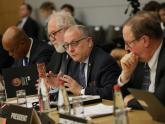"A more equitable globalization can only be achieved through multilateralism. Argentina believes that real solutions to global problems can only come from better and stronger international cooperation," stated Foreign Minister Jorge Faurie today in Paris, while chairing the first and most important plenary session of the High-Level Meeting of the OECD Development Centre.
"Multilateralism will be the core issue in Buenos Aires over the upcoming months, not only during the 11th WTO Ministerial Conference but also in 2018, when Argentina assumes the Presidency Pro Tempore of the G20 Group."
At the Château de la Muette, the headquarters of the Organization for Economic Co-operation and Development (OECD), alongside its Secretary General, Ángel Gurría, Faurie explained: "We are aware of the fact that transitioning to high- or upper-middle-income levels does not necessarily entail higher quality-of-life levels. Thus, the support for international development must provide for sustained policies that prevent reversal processes while social and institutional improvements are taking place."
"There is a premise that many of us present here believe in: the promotion of inclusive growth and open, transparent and equitable trade, so that income and opportunities are better distributed among the population. Faced with this new scenario, the Development Centre becomes a highly valuable forum to find points of convergence in order to reformulate each country's role in the new architecture of international cooperation," Faurie stated.
The head of Argentine diplomacy reiterated "the importance of fostering an inclusive cooperation system which, in addition to focusing on the most vulnerable countries, enables differentiated cooperation based on each country's needs and priorities. This requires collective answers that integrate the vision and effort of all actors of development, with no exclusions, taking into account the contexts, available resources and capabilities of each State."
Finally, Faurie asserted: "In the face of a reality that is increasingly complex and interdependent, we must definitively overcome the traditional 'donor-recipient' scheme that has governed international relations for so long, so that we may start thinking of ourselves as partners for development."
Press release No. 442/17
Press Office: 4819-7375 / 8296 / 7388
@CancilleriaARG


